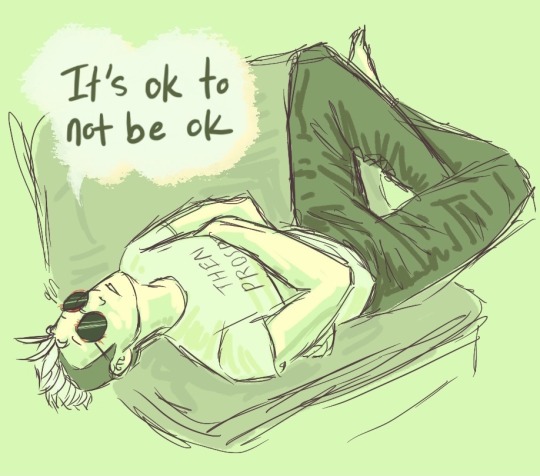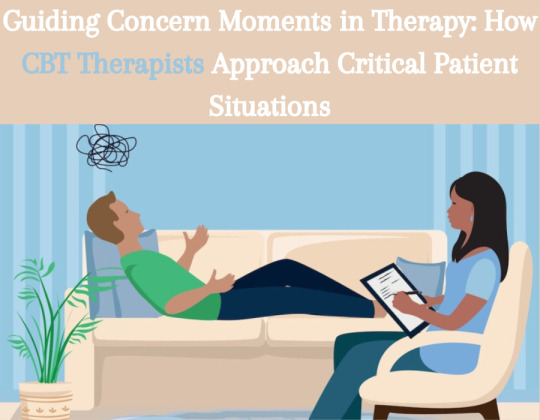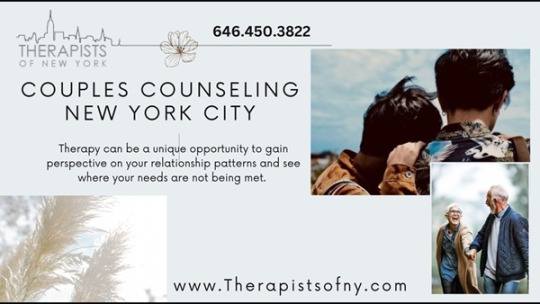#CBT therapists in NYC
Text
Is CBT Therapy an Effective Approach to Mental Health Problems?
Cognitive Behavioral Therapy (CBT) is a widely used and evidence-based treatment for mental health problems. CBT therapists in NYC are making a difference in the lives of people who struggle with mental health conditions by identifying and changing negative patterns of thought and behavior and replacing them with positive and productive ones.
Read More: https://www.issuewire.com/is-cbt-therapy-an-effective-approach-to-mental-health-problems-1756717399280011
0 notes
Text
Best Therapist For Cognitive Behavioral Therapy For Young Adults
Are you searching therapist for CBT therapy for young adults? If you are looking for a therapist who can effectively treat young adults and provide proper training, then I recommend considering CBT DBT Associates. They are known as one of the leading providers of CBT therapy for young adults. The CBT DBT team is highly knowledgeable and serves as a one-stop destination for individuals facing CBT and DBT problems. You can easily schedule an appointment through their website or contact them directly via phone.
0 notes
Note
Omg, your response was so amazing and helpful 😭❤ Thank you for taking the time to really get into all that. 💞 It also seems to have kinda sparked a conversation arround it, which is awesome! 😁
And ohhhhh ya, the religious trauma and gilt are real 😳🙄
You mentioned you have more to say if we want to hear it? I, for one, would LOVE to hear anything else you have to say on the topic! ❤
-🫖
Hi hi hi 🫖 anon!!
{Let’s Talk Religious Guilt and Trauma}
I am so glad that my response—Let’s Talk Healthy Solo Sex— was helpful and informative for you!! Of course!!! I want to give every ask and every anon the time and respect that they deserve ♥️♥️ And yes, I love that it sparked more of a conversation!! I’m so proud of you for reaching out and starting these discussions, anon!!! 🥰
I most definitely have more to say on the topic. For one, you can check out Let’s Talk Penetrative Sex and Let’s Talk Trauma in Relationships, which both stemmed from our conversation! And then there’s this response, fyi it will be another longer one 😊
*sigh* Yes, religious guilt and trauma are most definitely real. And those of experiences and feelings are so valid. Trauma of any kind is no joke. If you have any religious trauma or trauma of any other kind, I highly recommend that you seek a professional’s help.
So… What is Religious Trauma and Guilt?
A general definition for Religious Trauma is… “Religious trauma can happen when an individual’s religious experience has been damaging, abusive, degrading, stressful, or traumatic. When a religious experience is traumatic, it can damage your emotional, mental, physical, and spiritual health”. Check out Cohesive Therapy NYC’s article on Religious Trauma for more detailed information! For an article that goes more into Religious Guilt, check out Considering Counseling’s article on Religious Trauma and Guilt…! ♥️
Religious trauma and guilt are especially tricky beasts… Many twisted religious teachings and persuasion is very cult like. (That’s not to say that all are, there are definitely less twisted, healthier religions and practices) But the ones that are rotten and manipulative, they dig deep into your core beliefs, especially if you’re a child, and they replace your identity with the identity of the religion/church/cult.

So, how do you deal with religious trauma and guilt?
Firstly, as I said above, seek professional help (I recommend an EMDR specialist for trauma—EMDR is a type of therapy that works to restructure traumatic memories in your brain)
On your own accord, Processing, Accepting, and then Healing is the overall goal. Talking it out and processing your experience and feelings with a trusted person can be helpful for some. I find that talking to someone who has also had religious trauma or guilt to be even more helpful, because of how they can relate. Sometimes journaling/writing about it can be another helpful tool. The key is to find some way to express those emotions, to get them out of you.

Personally, my own story is that I have both religious trauma and guilt, but I definitely struggle more with my religious trauma. I was raised in a Catholic school and an Interfaith-Christian household. We moved around a lot, and so I went to many Christian churches like Non-Denominational, Baptist, Presbyterian, Catholic, and Southern Christian/Baptist. After the Catholic primary school, I moved to a Christian Charter school for six years. At that age, all my activities were based around my church and religious school; safe to say, religion was a very big part of my childhood. When Covid hit, I had had enough and I used the social distancing and the lockdown as a way to disconnect from the church. I effectively stopped going to church in 2020. I then took that time to explore my religious trauma and guilt, and this was where my healing journey began.
Everyone’s journey is different, and everyone’s journey is valid. ♥️
I began my work with my CBT therapist (Cognitive Behavioral Therapy— most therapy is CBT or Freudian). I found that most of my religious guilt was tied to my sexuality, and that I really struggled with being gay and being religious. So I explored that. I talked about it with lots of people, including my therapist, trusted family members, and other trusted religious people. I found that finding others who struggled with sexuality and religion was extremely helpful, it made me feel validated and not alone in the struggle. Today, I am way further along with my religious guilt than I was 3 years ago, but I definitely still have more to process, accept, and heal from.
Next there was my religious trauma. For this, I started with my CBT therapy as well. It was helpful, but after 3 years, I have run into a wall… It depends on the intensity of your trauma, because “little t” trauma is more easily resolved through CBT, whereas “capital T” trauma requires the neural network in your brain. My trauma is more “capital T”, and so I found that CBT therapy only helped me so much. This is why I recommend EMDR therapy for trauma. EMDR therapy targets restricting your neural network, working out the traumatic memories.

Everyone’s experience is different, so what worked for me and what didn’t work might be different for you, and that’s okay. This is only my experience. But I hope that it was a little helpful, and that you at least feel less alone in your feelings. Because they are so valid. ♥️♥️
So yea, those are my key points for religious trauma and guilt…! Hope this was somewhat relatable, helpful, and informative 🥰 Don’t hesitate to reach out and chat with me, ask or dm! Hope you have a lovely day/night!! 💞💞
Talk with Me ❤️🔥
#talk with me#i want to hear you#🫖 anon#anon asks#you are valid#i hear you#spread the awareness#spread the word#religious guilt and trauma#religious trauma#religious guilt#trauma#traumatic childhood#traumatic memories#traumatic experience#healing#healing from trauma#therapy#cbt therapy#Freudian therapy#emdr therapy#i'm traumatized#traumatized#cissyenthusiast010155 answers#spread the positivity
18 notes
·
View notes
Text
Finding Peace in the City: Therapists of New York Offer Support for Anxiety and Couples
Life in New York City moves at a dizzying pace, with its vibrant energy and endless opportunities. However, the fast-paced lifestyle and constant demands can take a toll on our mental health, leading to anxiety and stress. At Therapists of New York, we understand the unique challenges of city living and offer specialized support for individuals struggling with anxiety.
Our team of experienced therapists provides a safe and nurturing environment where you can explore your feelings, develop coping strategies, and learn to manage anxiety therapist more effectively. Through evidence-based techniques such as cognitive-behavioral therapy (CBT), mindfulness, and relaxation exercises, we empower you to regain control of your life and find inner peace amidst the chaos.
Anxiety can manifest in various forms, from generalized anxiety disorder to panic attacks, social anxiety, or specific phobias. Our therapists tailor treatment plans to meet your individual needs, addressing the root causes of your anxiety and equipping you with practical tools to overcome it. Whether you're struggling with intrusive thoughts, excessive worry, or physical symptoms like racing heart or difficulty breathing, we're here to support you every step of the way.
In addition to individual therapy for anxiety, Therapists of New York also offers specialized services for couples seeking to strengthen their relationship and overcome challenges together. In the dynamic environment of NYC, maintaining a healthy and fulfilling partnership can be particularly challenging, with busy schedules, external pressures, and communication barriers often getting in the way.
Our couples therapists are skilled in helping partners reconnect, improve communication, and navigate conflicts constructively. Whether you're facing issues related to trust, intimacy, or differing life goals, we provide a supportive space where you can explore your concerns openly and work towards shared solutions. Through couples therapy, you'll deepen your connection, build resilience, and lay the foundation for a more fulfilling relationship.
At Therapists of New York, we believe in the transformative power of therapy to heal, grow, and thrive. Whether you're struggling with anxiety as an individual or facing relationship challenges as a couple, our dedicated team is here to support you on your journey towards greater well-being and fulfillment. Take the first step towards a brighter future and contact us to schedule a consultation with one of our experienced therapists. You don't have to navigate life's challenges alone – we're here to help you find peace, connection, and resilience in the heart of the city that never sleeps.
0 notes
Text
Understanding the Role of Therapy in Treating Depression

Depression is a silent yet pervasive mental health condition that affects millions of people worldwide. It goes beyond feeling sad or experiencing occasional low moods. A person who is depressed may experience major negative effects on their life, including feelings of hopelessness, emptiness, and loneliness. While it may seem daunting to confront such emotions, seeking professional help from the best therapists in NYC can be a transformative step toward healing and recovery. In this piece of text, we examine the crucial role that therapy plays in the treatment of depression and the advantages of working with outstanding therapists in New York City.
Depression: A Complex Mental Health Challenge
Before delving into the role of therapy, it's essential to understand the complexity of depression. Depression can appear in many different ways, and its causes frequently involve a person's experiences, genetics, and environmental circumstances. Some common symptoms of depression include:
Persistent feelings of sadness or emptiness
Fatigue or loss of energy
Changes in appetite or weight
Difficulty concentrating or making decisions
Thoughts of self-harm or suicide
It's crucial to recognize that depression is not a sign of weakness or a character flaw. Instead, it is a legitimate medical condition that requires understanding, compassion, and proper treatment.
The Power of Therapy in Treating Depression
When it comes to managing and treating depression, therapy plays a pivotal role. It offers people a secure and accepting environment in which they can examine their feelings, ideas, and experiences. The greatest therapists in NYC are skilled professionals with knowledge of many therapeutic philosophies, enabling them to customize their care to meet the distinctive needs of each patient.
- Unraveling Underlying Issues:
Depression often arises from a combination of factors, and therapy aims to unravel these underlying issues. By investigating a person's past, experiences, and cognitive patterns, therapists can identify the underlying causes of depression. This deeper understanding allows for targeted interventions and strategies to address specific triggers and challenges.
- Cognitive Behavioral Therapy (CBT):
One of the most effective therapeutic approaches for treating depression is Cognitive Behavioral Therapy (CBT). CBT focuses on identifying negative thought patterns and behaviors and replacing them with healthier, more positive alternatives. The best therapists in NYC are adept at using CBT techniques to help clients reframe their thoughts and develop coping mechanisms to manage depressive symptoms.
- Providing Emotional Support:
Depression can be an isolating experience, making individuals feel like they are facing their struggles alone. Therapists provide the emotional support required to go through challenging emotions by being a sympathetic and empathic presence. The therapeutic relationship itself can be a source of comfort and validation, fostering a sense of connection and understanding.
- Developing Coping Strategies:
Living with depression can be overwhelming, and therapy equips individuals with effective coping strategies to manage their emotions and challenges. Whether it's through relaxation techniques, mindfulness practices, or developing healthy routines, therapists work with their clients to develop practical tools for self-care and emotional regulation.
- Medication and Therapy Integration:
In some cases, medication may be prescribed to manage severe depressive symptoms. The best therapists in NYC often collaborate with psychiatrists or medical professionals to ensure a comprehensive approach to treatment. The integration of therapy and medication can lead to more successful outcomes, addressing both the psychological and physiological aspects of depression.
- Goal Setting and Progress Monitoring:
Therapy provides a structured environment for setting goals and monitoring progress. These goals can range from simple everyday tasks to larger milestones on the path to recovery. By breaking down the journey into manageable steps, therapy instills a sense of accomplishment and motivation to continue working toward healing.
- Empowering Self-Reflection and Awareness:
Understanding one's emotions and thought patterns is crucial for managing depression effectively. Therapists help people acquire an understanding of their behavioral patterns and emotional responses by encouraging self-reflection and self-awareness. This heightened self-awareness enables clients to make positive changes and implement healthier coping mechanisms.
- Preventing Relapse:
Depression can be accompanied by various barriers that hinder progress. These could include self-doubt, negative mental patterns, and previous traumas. Skilled therapists help clients identify and address these barriers, facilitating progress toward healing and recovery.
Seeking Help from the Best Therapists in NYC
Acknowledging the need for help and taking that first step towards therapy is an act of courage and self-compassion. The greatest therapists in NYC are aware of the difficulties associated with depression and offer their patients a secure, encouraging environment in which to express their feelings without fear of rejection. Let's explore how taking that first step toward therapy can lead to transformative change and healing.
- Breaking the Stigma:
Sadly, there is still a stigma surrounding mental health, particularly when it comes to seeking professional help for depression. However, reaching out to the best therapists in NYC demonstrates a willingness to prioritize mental well-being and breaks down the barriers that prevent individuals from seeking support. Making that first move opens the door for others to follow suit, promoting an atmosphere of free speech and comprehension.
- Validation and Empathy:
Depression can leave individuals feeling isolated and misunderstood. Engaging with a skilled therapist provides a space where one's experiences and emotions are validated and met with empathy. This validation can be incredibly healing, as clients feel heard and understood, often for the first time in a long while.
- Tailored Treatment Plans:
Every individual's experience of depression is unique, and the best therapists in NYC recognize the importance of personalized treatment plans. In the first sessions, therapists collaborate with their clients to comprehend their unique requirements and difficulties. This collaborative approach ensures that the therapy is tailored to address the client's specific goals and concerns.
- Cultivating Coping Strategies:
Depression can be accompanied by various barriers that hinder progress. These could include self-doubt, negative mental patterns, and previous traumas. Skilled therapists help clients identify and address these barriers, facilitating progress toward healing and recovery.
- Supportive Therapeutic Relationships:
The therapeutic relationship between a client and their therapist is a vital component of the healing process. The top therapists in NYC develop enduring connections with their patients that are encouraging and strong, promoting a sense of security and trust. This strong foundation enables clients to explore their deepest emotions and thoughts, knowing they are in a non-judgmental and compassionate space.
- A Journey of Self-Discovery:
Therapy is not just about treating symptoms; it is also a journey of self-discovery and growth. Clients gain insights into their thought patterns, behaviors, and emotional responses, which can lead to profound shifts in perspective. Clients are empowered to make healthy adjustments and gain a better sense of self through this journey of self-awareness.
- Overcoming Barriers to Progress:
Depression can be accompanied by various barriers that hinder progress. These could include self-doubt, negative mental patterns, and previous traumas. Skilled therapists help clients identify and address these barriers, facilitating progress towards healing and recovery.
Conclusion
Compassion, sympathy, and the greatest treatment should be given to those who are suffering from depression, a complicated mental health illness. One of the most effective steps toward healing and recovery is to look for support from the best therapists in NYC.
Contacting the top therapists in NYC could make all the difference if you or a loved one is depressed. A setting that is safe and encouraging for growth, healing, and empowerment is provided by therapy. Take the initial step toward treatment and set out on a path of self-discovery and newfound optimism. Do not forget that you are not the only one battling depression. The road to recovery becomes slightly more lucid and approachable with the help of knowledgeable therapists.
Read the full article
0 notes
Text
Finding a Bipolar Therapist

Whether you need help finding a Bipolar Therapist in New York City or an online one, a Bipolar Therapist can help you manage your condition. Several trustworthy services provide free live chats with experts for the first few minutes.
This is an excellent time to ask questions, express concerns, and confirm the expert's suitability. In addition, writing out your concerns before talking to a potential expert helps you focus and get the most value for your money.
Bipolar Therapist Aid
A strong support network is very important in dealing with bipolar disorder. It can help tremendously to have someone face-to-face who can listen to your concerns and give you encouragement. It's important to realize that a cure won't come overnight, so be patient with the process.
Psychotherapy is also a very important part of dealing with bipolar disorder. It helps you learn about the disorder and its early warning signs, and it can help you develop a plan for managing your moods. It can also help you get back on track with your medication, and improve your relationships.
You can access professional online therapy through BetterHelp, which has helped nearly three million people. You can take a quiz to find a therapist that fits your needs and lifestyle.
Your lifestyle can also have an impact on your mood. To stabilize your mood swings, try to make a daily schedule. Establish a time for sleeping, eating, socializing, working, and relaxing. This consistency will help you keep your moods stable and avoid the extremes that often occur with bipolar disorder.

Bipolar Therapist in NYC
For those with bipolar disorder, finding a therapist who understands the disorder and has the skill to deal with it can be challenging. The disorder causes extreme mood swings and is characterized by periods of mania and depression. Some symptoms of this condition include being too energetic and irritable, losing interest in once-favorite activities, and thoughts of suicide.
Treatments exist, which is good news, because they allow people with mental health issues to learn to live with their condition. Dr. Malkin works with individuals who suffer from bipolar disorder and helps them find the right treatment for their unique case.
You can get assistance from a bipolar therapist in New York if you have bipolar disorder. Bipolar disorder is a debilitating condition, and if left untreated, it can affect a person's relationships and ability to function daily. It can also lead to the use of substances and other high-risk behaviors. Bipolar therapy helps to treat these conditions, and Williamsburg Therapy Group specializes in this field.
Even while bipolar disorder can be extremely challenging to live with, it is manageable with the correct treatment and support. Psychotherapy can help patients minimize their symptoms and avoid unwanted behaviors. It can also help people develop coping skills and improve their relationships. Therapy can also help people cope with substance abuse issues.
https://youtu.be/r8qLh8Jf-x4
Bipolar Therapist Online
The Internet provides many resources to help you deal with your bipolar disorder, from support groups to peer-led forums. These forums are often a free resource to help you find other people in your situation. Many of these groups are led by bipolar disorder patients and are open to people from all over the world.
They offer peer-to-peer support, as well as caregiver and family support groups. By joining an online group, you can share your stories, get emotional support, and gain a common understanding of the bipolar disorder.
A bipolar therapist will work to help you understand the disorder. They may use talk therapy or psychoeducation. Some may also use CBT, which helps patients identify triggers and manage them. While this type of treatment is not a cure for bipolar, it can be a great tool to help you cope.
Related Article: Bipolar Disorder Myths
Read the full article
0 notes
Text
Cognitive Behavioral Therapy in NYC
Cognitive Behavioral Therapy (CBT) is a highly effective treatment for various mental health issues such as anxiety, depression, and post-traumatic stress disorder. In NYC, Paige Rechtman is a renowned CBT therapist who can help individuals overcome negative thinking patterns and behaviors that lead to distress. Through CBT, Paige helps her clients identify and challenge their negative thoughts, resulting in a more positive and productive mindset.
1 note
·
View note
Text










I’ve got a new OC that I’m currently obsessed with drawing—born because Faoust & friends need So Much Therapy right now, and @thebiggestnerd let me have the honors of making a therapist when I suggested “what if therapist…but also cryptid???”
Thus we have Mo Taiman [full first name Mortakaimbat, because Alicia suggested it and I said “no wonder he goes by Mo”], unlicensed therapist specializing in the magical/supernatural community. He’s a mothman (not THE mothman, that would be his cousin). He didn’t want to be a prophet of doom (the family business of mothmen) and instead left West Virginia for NYC to learn how to become a therapist. His office is a converted camper van, and his preferred treatment style is CBT. His online username is lepidoptherapy. The wings can be hidden at will, and his design is based on luna moths (don’t worry, he can eat though, unlike luna moths. He’s a fan of cold brew and key lime pie).
#oc art#my oc#original character#original art#fantasy therapist#original drawing#mo taiman#mothman oc#cryptid oc#mothivational poster#mothivation
9 notes
·
View notes
Text
Find the Best Cognitive Behavioral Therapist In NYC and Florida
Dr. Napolitano is a licensed cognitive behavioral therapist nyc. She is an expert in both cognitive-behavioral (CBT) and dialectical behavior therapy know more she can help you and her services today!
Email Us: [email protected]
Call Us: (732)-654-6630
0 notes
Text
Guiding Concern Moments in Therapy: How CBT Therapists Approach Critical Patient Situations

In the realm of cognitive-behavioral therapy (CBT), therapists face critical moments when a patient's feelings surge, and distress or problem becomes evident. These key junctures demand a careful, structured process to ensure the patient's security, emotional well-being, and progress within therapy.
Recognizing Critical Moments
CBT therapists are attuned to signs showing critical patient situations. These power include escalating anxiety, expressions of severe distress, or thoughts of self-harm. Identifying these cues promptly enables therapists to intervene virtually.
Immediate Intervention Protocols
When faced with a critical situation, CBT therapists prioritize safety. Immediate interventions often involve grounding techniques, breathing exercises, or stimulating the patient to contact emergency services or a trusted support system.
Empathy and Supportive Dialogue
During critical points, the therapist's role shifts towards providing a safe space for the patient to express their feelings without judgment. Empathy, active listening, and validation play crucial roles in creating a supportive environment.
Utilizing CBT Techniques
While managing critical situations, CBT therapists may implement specific techniques tailored to the patient's needs. This might involve challenging negative thought patterns, reframing distressing situations, or teaching coping mechanisms to regulate emotions.
Establishing Safety Plans
In collaboration with the patient, therapists craft safety plans outlining steps to take when facing overwhelming emotions or thoughts. These plans serve as proactive tools empowering patients to navigate critical situations outside therapy sessions.
Building Resilience and Coping Strategies
CBT therapists focus on equipping patients with tools to build resilience. This includes teaching adaptive coping strategies, problem-solving skills, and fostering a sense of self-efficacy in managing distress.
Collaborative Decision-Making
Critical moments often necessitate collaborative decision-making. Therapists and patients work together to explore available options, ensuring the chosen course of action aligns with the patient's well-being and therapeutic goals.
Post-Crisis Reflection and Support
Following a critical incident, CBT therapists offer post-crisis support. Reflective discussions help patients process the experience, identify triggers, and develop strategies to prevent or manage similar situations in the future.
Continuous Monitoring and Follow-up
After a critical moment, CBT therapists maintain regular contact and conduct follow-up sessions to assess the patient's progress. This ongoing support ensures continuity of care and provides opportunities for further intervention if necessary.
Conclusion
Navigating critical moments in therapy demands a delicate balance of empathy, immediate intervention, collaborative decision-making, and ongoing support. CBT therapists employ a multifaceted approach aimed at ensuring patient safety, resilience-building, and progress within the therapeutic journey. These critical junctures, while challenging, often serve as catalysts for meaningful breakthroughs and long-term therapeutic success. If you are looking for the best CBT therapist in New York and Miami, I highly recommend going to CBT DBT Associates. Their team is extremely knowledgeable, and millions of people have agreed after receiving their services.
Feel free to adjust or add specific examples or case studies to further illustrate how CBT therapists handle critical situations, depending on the context you wish to present in the blog.
Originally published at https://youngadulttherapy.mystrikingly.com/blog/guiding-concern-moments-in-therapy-how-cbt-therapists-approach-critical on December 19, 2023
0 notes
Text
Navigating Relationships and Anxiety: Couples Counseling and Panic Attack Therapy in NYC

Living in New York City brings its own set of rewards and challenges, especially when it comes to relationships and mental health. Couples may find themselves grappling with communication breakdowns, conflicts, or the stress of city life, while individuals may struggle with anxiety disorders like panic attacks. At Therapists of New York, we understand these complexities and offer expert guidance through couples counseling and panic attack therapy.
Couples counseling New York City is designed to help partners navigate relationship difficulties, improve communication, and strengthen emotional bonds. Our experienced therapists provide a non-judgmental space where couples can explore their concerns, identify patterns of behavior, and develop healthier ways of relating to each other. Whether you're facing conflicts, infidelity, or simply seeking to enhance intimacy, our tailored approach to couples therapy can help you rebuild trust and connection.
For individuals struggling with panic attacks in NYC, our specialized therapy services offer practical strategies for managing anxiety and reclaiming control over your life. Panic attacks can be overwhelming, but with the right support, they can be effectively managed. Our therapists work collaboratively with clients to understand the triggers and underlying causes of panic attacks, develop coping skills, and cultivate a sense of calm and resilience. Through evidence-based techniques such as cognitive-behavioral therapy (CBT) and mindfulness, we empower individuals to overcome panic attacks and live more fulfilling lives.
At Therapists of New York, we prioritize the well-being of our clients and strive to provide personalized care that meets their unique needs. Whether you're seeking couples counseling or panic attack therapy in NYC, our team of compassionate therapists is here to support you every step of the way. Take the first step towards healing and schedule a consultation today.
0 notes
Text
NYC Trauma Therapist

Ruifan Zeng, Ph.D.
Clinical Psychologist and Supervisor
Do you feel stuck repeating the same patterns, unsure as to why you feel anxious, depressed, or unsatisfied? Many of us face barriers both in our circumstances and within ourselves, which can make things feel out of control. Therapy can help us uncover some of the agency and authority we do have – allowing us to understand how our past experiences might be alive in the present, and how we might make different choices for our present and future. It is a process that asks you to challenge yourself and make a commitment to your well-being, and I believe that a supportive therapeutic relationship that helps you feel safe to truly examine yourself can foster immense growth.
My approach is integrative, rooted in a psychodynamic framework and drawing on cognitive-behavioral therapy (CBT) and dialectical-behavioral therapy techniques (DBT). I value collaboration to tailor treatment to your particular issues and needs. Above all, I am committed to creating a nonjudgmental, culturally-sensitive, empathic environment, as well as using levity, to help you cope and make meaning, gain greater insight into underlying patterns, and achieve personal goals. My focus is on helping patients negotiate more fulfilled, gratifying lives.
Taking the step to seek therapy is courageous. With curiosity, an open mind, and a willingness to change, we can work together to understand your particular context, find solutions, and bring awareness to your strengths and potential.
Areas of Expertise:
Anxiety
Depression
Life transitions/stressors
Cultural identity, acculturation issues
Trauma and PTSD
Interpersonal conflict
Eating disturbances
Chronic medical illnesses (and caregiving)
Experience and Education:
Ph.D. in Clinical Psychology, Long Island University – Brooklyn
Postdoctoral Fellowship, Northeast Regional Epilepsy Group
Doctoral Intern, Columbia University Medical Center/New York-Presbyterian Hospital
Royal Hospital (London), Child and Adolescent Mental Health Services
Certification in Prolonged Exposure for PTSD, University of Pennsylvania
Neuropsychology Practicum Training: Columbia University Dept. of Pediatric Neurology
Practicum Training: Mount Sinai Beth Israel Medical Center, Adult/Geriatric Inpatient Psychiatry, Peter Krueger Clinic Outpatient Mental Health Services
Practicum Training: Long Island University-Brooklyn Psychological Services Center
Licensed Clinical Psychologist (United Kingdom), National Health Service
New York State License 022902
Click here to schedule an appointment.
0 notes
Text
CBD Creams: A Strategic Approach to Stress and Muscle Relief

Depression is a silent yet pervasive mental health condition that affects millions of people worldwide. It goes beyond feeling sad or experiencing occasional low moods. A person who is depressed may experience major negative effects on their life, including feelings of hopelessness, emptiness, and loneliness. While it may seem daunting to confront such emotions, seeking professional help from the best therapists in NYC can be a transformative step toward healing and recovery. In this piece of text, we examine the crucial role that therapy plays in the treatment of depression and the advantages of working with outstanding therapists in New York City.
Depression: A Complex Mental Health Challenge
Before delving into the role of therapy, it's essential to understand the complexity of depression. Depression can appear in many different ways, and its causes frequently involve a person's experiences, genetics, and environmental circumstances. Some common symptoms of depression include:
Persistent feelings of sadness or emptiness
Fatigue or loss of energy
Changes in appetite or weight
Difficulty concentrating or making decisions
Thoughts of self-harm or suicide
It's crucial to recognize that depression is not a sign of weakness or a character flaw. Instead, it is a legitimate medical condition that requires understanding, compassion, and proper treatment.
The Power of Therapy in Treating Depression
When it comes to managing and treating depression, therapy plays a pivotal role. It offers people a secure and accepting environment in which they can examine their feelings, ideas, and experiences. The greatest therapists in NYC are skilled professionals with knowledge of many therapeutic philosophies, enabling them to customize their care to meet the distinctive needs of each patient.
1. Unraveling Underlying Issues:
Depression often arises from a combination of factors, and therapy aims to unravel these underlying issues. By investigating a person's past, experiences, and cognitive patterns, therapists can identify the underlying causes of depression. This deeper understanding allows for targeted interventions and strategies to address specific triggers and challenges.
2. Cognitive Behavioral Therapy (CBT):
One of the most effective therapeutic approaches for treating depression is Cognitive Behavioral Therapy (CBT). CBT focuses on identifying negative thought patterns and behaviors and replacing them with healthier, more positive alternatives. The best therapists in NYC are adept at using CBT techniques to help clients reframe their thoughts and develop coping mechanisms to manage depressive symptoms.
3. Providing Emotional Support:
Depression can be an isolating experience, making individuals feel like they are facing their struggles alone. Therapists provide the emotional support required to go through challenging emotions by being a sympathetic and empathic presence. The therapeutic relationship itself can be a source of comfort and validation, fostering a sense of connection and understanding.
4. Developing Coping Strategies:
Living with depression can be overwhelming, and therapy equips individuals with effective coping strategies to manage their emotions and challenges. Whether it's through relaxation techniques, mindfulness practices, or developing healthy routines, therapists work with their clients to develop practical tools for self-care and emotional regulation.
5. Medication and Therapy Integration:
In some cases, medication may be prescribed to manage severe depressive symptoms. The best therapists in NYC often collaborate with psychiatrists or medical professionals to ensure a comprehensive approach to treatment. The integration of therapy and medication can lead to more successful outcomes, addressing both the psychological and physiological aspects of depression.
6. Goal Setting and Progress Monitoring:
Therapy provides a structured environment for setting goals and monitoring progress. These goals can range from simple everyday tasks to larger milestones on the path to recovery. By breaking down the journey into manageable steps, therapy instills a sense of accomplishment and motivation to continue working toward healing.
7. Empowering Self-Reflection and Awareness:
Understanding one's emotions and thought patterns is crucial for managing depression effectively. Therapists help people acquire an understanding of their behavioral patterns and emotional responses by encouraging self-reflection and self-awareness. This heightened self-awareness enables clients to make positive changes and implement healthier coping mechanisms.
8. Preventing Relapse:
Depression can be accompanied by various barriers that hinder progress. These could include self-doubt, negative mental patterns, and previous traumas. Skilled therapists help clients identify and address these barriers, facilitating progress toward healing and recovery.
Seeking Help from the Best Therapists in NYC
Acknowledging the need for help and taking that first step towards therapy is an act of courage and self-compassion. The greatest therapists in NYC are aware of the difficulties associated with depression and offer their patients a secure, encouraging environment in which to express their feelings without fear of rejection. Let's explore how taking that first step toward therapy can lead to transformative change and healing.
1. Breaking the Stigma:
Sadly, there is still a stigma surrounding mental health, particularly when it comes to seeking professional help for depression. However, reaching out to the best therapists in NYC demonstrates a willingness to prioritize mental well-being and breaks down the barriers that prevent individuals from seeking support. Making that first move opens the door for others to follow suit, promoting an atmosphere of free speech and comprehension.
2. Validation and Empathy:
Depression can leave individuals feeling isolated and misunderstood. Engaging with a skilled therapist provides a space where one's experiences and emotions are validated and met with empathy. This validation can be incredibly healing, as clients feel heard and understood, often for the first time in a long while.
3. Tailored Treatment Plans:
Every individual's experience of depression is unique, and the best therapists in NYC recognize the importance of personalized treatment plans. In the first sessions, therapists collaborate with their clients to comprehend their unique requirements and difficulties. This collaborative approach ensures that the therapy is tailored to address the client's specific goals and concerns.
4. Cultivating Coping Strategies:
Depression can be accompanied by various barriers that hinder progress. These could include self-doubt, negative mental patterns, and previous traumas. Skilled therapists help clients identify and address these barriers, facilitating progress toward healing and recovery.
5. Supportive Therapeutic Relationships:
The therapeutic relationship between a client and their therapist is a vital component of the healing process. The top therapists in NYC develop enduring connections with their patients that are encouraging and strong, promoting a sense of security and trust. This strong foundation enables clients to explore their deepest emotions and thoughts, knowing they are in a non-judgmental and compassionate space.
6. A Journey of Self-Discovery:
Therapy is not just about treating symptoms; it is also a journey of self-discovery and growth. Clients gain insights into their thought patterns, behaviors, and emotional responses, which can lead to profound shifts in perspective. Clients are empowered to make healthy adjustments and gain a better sense of self through this journey of self-awareness.
7. Overcoming Barriers to Progress:
Depression can be accompanied by various barriers that hinder progress. These could include self-doubt, negative mental patterns, and previous traumas. Skilled therapists help clients identify and address these barriers, facilitating progress towards healing and recovery.
Conclusion
Compassion, sympathy, and the greatest treatment should be given to those who are suffering from depression, a complicated mental health illness. One of the most effective steps toward healing and recovery is to look for support from the best therapists in NYC.
Contacting the top therapists in NYC could make all the difference if you or a loved one is depressed. A setting that is safe and encouraging for growth, healing, and empowerment is provided by therapy. Take the initial step toward treatment and set out on a path of self-discovery and newfound optimism. Do not forget that you are not the only one battling depression. The road to recovery becomes slightly more lucid and approachable with the help of knowledgeable therapists.
In the bustling world you live in, stress and muscle discomfort have become commonplace, challenging your overall well-being. As traditional solutions increasingly feel outdated or inadequate, you may find yourself seeking more natural approaches to these challenges.
Here enters CBD, a plant-derived compound on the rise, gaining popularity for its potential therapeutic properties.
The Basics of CBD
Delving into the world of CBD can sometimes be complex. While CBD is an abbreviation for cannabidiol - a major compound found within cannabis plants - it's essential to comprehend that it won’t get you high like its infamous cousin THC (tetrahydrocannabinol).
The extraction process isolates CBD from the plant materials yielding different forms like oils, tinctures, edibles, and topical solutions such as creams. You might want to consider opting for the best CBD cream for its unique application advantage.
CBD and the Human Body
Your body houses a fascinating system called the endocannabinoid system (ECS) responsible for maintaining an internal balance or homeostasis. This intricate network involves receptors known as CB1 and CB2 to which your body’s own endocannabinoids attach.
Enter CBD - it indirectly influences this system positively affecting your body's ECS functions, potentially resulting in reduced pain perception and improved mood regulation.
The Role of CBD Creams
CBD creams offer a unique method of delivery being applied directly on your skin. Similar to how a moisturizer works by hydrating the top layer of your skin, a quality CBD cream can release cannabidiol into your skin cells where it engages with nearby cannabinoid receptors.
This localized application enables you to address specific areas of discomfort or stress directly, making it potentially more effective than orally consumed CBD.
Strategic Approach to Stress
Emerging research suggests that topical CBD may prove beneficial in promoting relaxation. Anxiety and unhelpful behaviors are not always easily treated. However, topical CBD creams may offer a solution.
When applied, these creams can interact with your skin's cannabinoid receptors, subtly influencing your body's stress response system and potentially delivering calming effects.
While choosing the most suitable product can be highly individual based on your preferences and needs, opt for high-quality, broad-spectrum CBD creams for optimal results.
Strategic Approach to Muscle Relief
You might often find your muscles fatigued as a result of strenuous physical activities or long sedentary hours.
Apply CBD cream to provide potential relief. As it penetrates the skin layers and works almost instantly on localized cannabinoid receptors, it can help in soothing muscle tension. Always ensure the cream you choose has been third-party tested to confirm its potency and quality.
Potential Side-effects and Precautions
While CBD is generally considered safe, some might experience minor side effects such as skin redness or itchiness. If you are pregnant, nursing, or on medications, it's vital to consult with a healthcare provider before starting your CBD journey.
Legal Status and Accessibility
You may be pleased to know that the legal status of CBD has significantly improved worldwide in recent years. As such, purchasing quality CBD creams has become quite accessible. However, laws can vary so always check local regulations.
Dispelling Common Myths Surrounding CBD
As you arrive at the forefront of deciding about integrating CBD creams into your routine, it's essential to dispel any clouding misconceptions surrounding CBD. For one, unlike THC, CBD is non-psychoactive.
This means it doesn’t produce the familiar "high" associated with consuming marijuana. Hence, using CBD creams won’t interfere with your daily activities or cause mental fog.
Another common mix-up occurs between hemp and marijuana - both belonging to the Cannabis plant family but boasting remarkably different properties. The greatest difference lies in their THC content. While marijuana typically has high THC content, industrial hemp contains trace amounts only (0.3% or less as per legal definition). The cannabidiol used in topical creams often comes from this legal, low THC hemp making these products safe for regular use.
Methods of Enhancing CBD Cream Effectiveness
Once you've incorporated a good-quality CBD cream in your self-care regime for tackling stress and muscle discomfort, understand that it’s not a magic bullet - rather it works best as part of your overall wellness strategy. Some people find cognitive behavioral therapy helps with stress management, while others combine techniques such as meditation with CBD.
For instance, if you're targeting muscle relief remember to continue with exercises or physiotherapy consultations as recommended by healthcare professionals.
Similarly, if relaxation is the goal, remain steadfast on techniques like deep breathing or yoga while applying your favorite CBD cream. As with any natural remedy, consistency counts - regular application can propel benefits forward.
Wrapping Up
In conclusion, finding natural and strategic means to manage stress and muscle discomfort is indeed liberating. As you navigate through life's ups and downs, think about embracing CBD creams in your journey.
Hold steadfast though - research is still catching up to anecdotal claims. But the undeniable possibilities emerging from this natural source signal that CBD reflective self-care could just be the trailblazer for your well-being.
Read the full article
0 notes
Text
Group Therapy NYC

Group therapy NYC offers the benefits of therapy in a group setting. Regularly talking about your issues with fellow members of the group helps you to put things into perspective. Group therapy also encourages members to offer each other support and feedback. Each session lasts 60 minutes. You can expect to talk about your problems, and receive positive feedback, as well as share your own reactions.
Group Therapy New York
Group therapy NYC is a powerful modality to help individuals overcome personal challenges. It provides the opportunity to learn from and relate to others who are experiencing similar experiences. It also allows clients to learn new skills and develop adaptive behaviors. One NYC group that specializes in group therapy is Let's Talk Psychological Wellness. This organization serves adults from across the city.
In group therapy NYC, members work with a psychologist to discuss their personal experiences. This helps them understand the issues and understand themselves. They also learn about their own lives and how they affect others.
Ultimately, group therapy NYC can help individuals identify patterns in their lives and learn how to communicate with others more effectively. It's a great way to make sense of problems, improve relationships, and gain greater self-awareness.

The Therapy Group of NYC is a group of psychologists who focus on data-driven treatments to help clients thrive. They use cognitive behavioral therapy (CBT) and other proven methods to help their clients overcome their challenges. Their team of psychologists treats a variety of issues and also offers training to other therapists.
While most group therapy is open to everyone, some require that you have an individual therapy session before being accepted into the group. The group therapist will discuss your unique experiences and discuss the possible ways you can cope better. This will help you work through your challenges and develop healthier habits. Therapy can also help you overcome past trauma.
The Therapy Group of NYC is a collaborative effort of therapists in Manhattan who aim to help people heal and grow. Therapy groups are a good option for those who are experiencing depression or anxiety. They can also help people with their careers. The Manhattan group uses leading trends in technology and APIs to help clients improve their lives.
Many people experience a sense of community and support when they attend group therapy NYC. The group environment makes it easier to explore personal problems, develop a deeper awareness of feelings and try new social interactions. The process of therapy is also confidential.
Related Article: Free Therapy NYC
Read the full article
0 notes